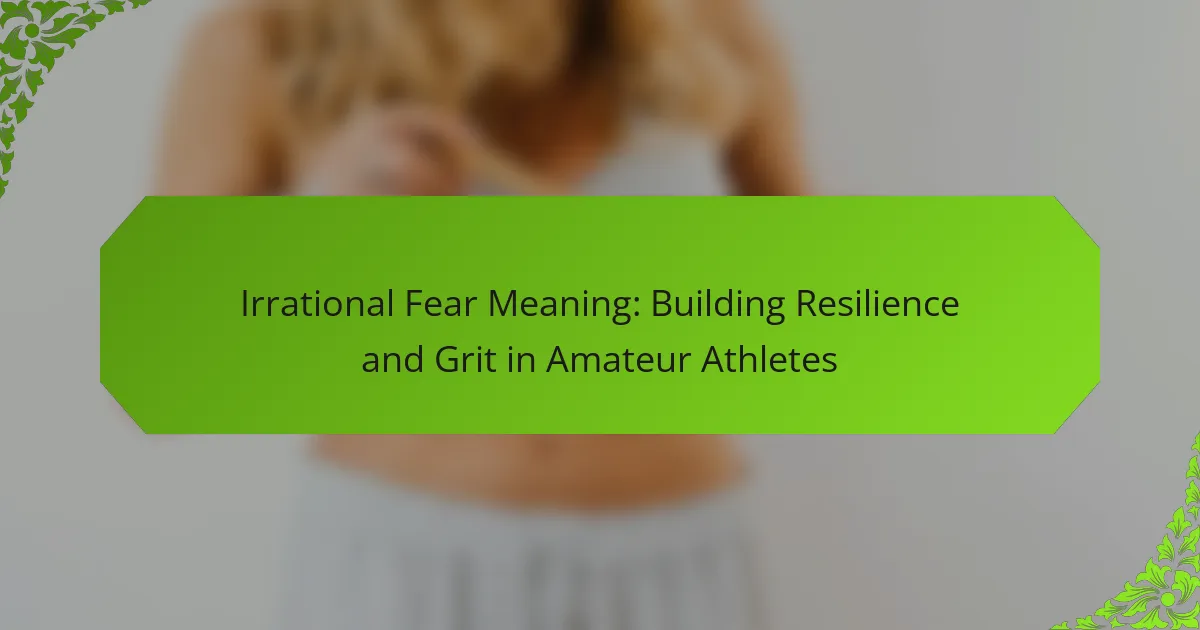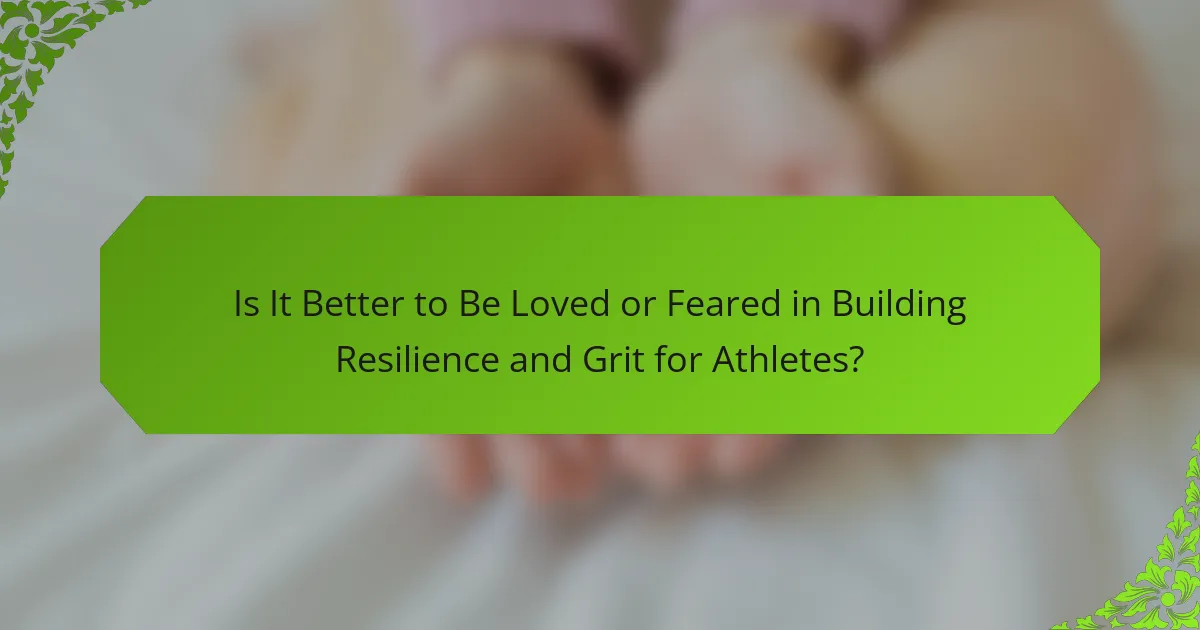Building resilience and grit is crucial for amateur athletes aiming to overcome challenges and achieve their goals. This article explores how to cultivate a growth mindset, set realistic goals, and develop effective coping strategies. It highlights the importance of social support and maintaining a healthy lifestyle. Additionally, it emphasizes the role of adaptability and emotional intelligence in enhancing resilience and grit.

What is Resilience and Grit in Amateur Athletes?
Resilience and grit are essential traits for amateur athletes, enabling them to overcome challenges and persist through adversity. Resilience involves adapting to setbacks, while grit refers to sustained effort towards long-term goals. Together, these attributes enhance performance and mental toughness. Research shows that athletes with high resilience and grit are more likely to achieve their objectives, demonstrating a unique ability to maintain focus and motivation despite obstacles. Developing these traits can significantly impact an athlete’s overall success and well-being.
How do resilience and grit contribute to athletic performance?
Resilience and grit significantly enhance athletic performance by fostering mental toughness and perseverance. Athletes with high resilience adapt to challenges, maintaining focus during setbacks. Grit promotes sustained effort over time, crucial for achieving long-term goals. Research indicates that athletes with these traits often outperform their peers, particularly in high-pressure situations. As a result, cultivating resilience and grit can lead to improved performance and greater success in amateur sports.
Why are these qualities essential for amateur athletes?
Resilience and grit are essential for amateur athletes as they foster perseverance and adaptability. These qualities enable athletes to overcome challenges and setbacks, enhancing their performance. Studies show that resilient athletes are more likely to achieve long-term success, as they maintain focus and motivation despite obstacles. Grit, defined as passion and perseverance for long-term goals, correlates with improved training outcomes and competitive performance. Together, these attributes build a strong mental framework that supports athletes in their journey, making them more effective in both sports and life.

What are the universal practices for building resilience?
To build resilience, focus on positive thinking, goal setting, and stress management. These practices empower amateur athletes to adapt and thrive in challenging situations.
1. Cultivate a growth mindset: Embrace challenges as opportunities for learning and improvement.
2. Set realistic goals: Break down larger objectives into manageable steps to maintain motivation.
3. Develop coping strategies: Use techniques like mindfulness and deep breathing to manage stress effectively.
4. Seek social support: Build a network of friends, family, and mentors for encouragement and guidance.
5. Maintain a healthy lifestyle: Prioritise nutrition, exercise, and sleep to enhance physical and mental well-being.
How can goal-setting enhance resilience?
Goal-setting enhances resilience by providing direction and motivation. It fosters a sense of purpose, enabling amateur athletes to focus on specific outcomes. This clarity helps them navigate challenges and setbacks effectively. Research indicates that athletes with clear goals demonstrate higher perseverance and emotional strength during adversity. By setting achievable milestones, they can track progress, reinforcing their grit and determination.
What are effective techniques for setting achievable goals?
Effective techniques for setting achievable goals include defining specific objectives, breaking them into manageable tasks, and establishing a timeline. Focus on measurable outcomes to track progress. Regularly review and adjust goals to maintain motivation. Emphasising resilience helps athletes overcome setbacks, enhancing their grit and commitment to personal growth.
What role does positive self-talk play in resilience?
Positive self-talk significantly enhances resilience by fostering a growth mindset. It enables amateur athletes to reframe challenges as opportunities for improvement, which boosts motivation and persistence. Research indicates that athletes who engage in positive self-talk experience reduced anxiety and improved performance. This mental strategy empowers them to navigate setbacks effectively, reinforcing their grit and determination. By cultivating a habit of positive self-talk, athletes can develop a unique attribute of resilience that supports their long-term success.
How can visualization techniques strengthen mental fortitude?
Visualization techniques can significantly enhance mental fortitude by fostering resilience and focus in amateur athletes. These techniques allow athletes to mentally rehearse their performance, reducing anxiety and improving confidence. By visualising success, athletes create a mental blueprint that reinforces positive outcomes, which is crucial for developing grit. Studies show that regular use of visualization can lead to improved performance metrics, such as faster reaction times and better decision-making under pressure. Additionally, visualization helps in overcoming setbacks by promoting a growth mindset, enabling athletes to view challenges as opportunities for development.

What unique strategies can athletes employ to cultivate grit?
Athletes can cultivate grit by employing strategies such as setting specific goals, embracing challenges, and practicing self-reflection. Goal setting helps create a clear vision of success and keeps motivation high. Embracing challenges fosters resilience, allowing athletes to push through adversity. Self-reflection enhances awareness of progress and areas for improvement, reinforcing a growth mindset. These strategies build a robust foundation for resilience and grit in amateur athletes.
How does embracing failure contribute to grit development?
Embracing failure enhances grit development by fostering resilience and a growth mindset. Athletes learn to view setbacks as learning opportunities, which strengthens their determination. This mindset shift encourages persistence despite challenges, ultimately leading to improved performance and mental toughness. Studies show that athletes who embrace failure are more likely to achieve long-term success.
What are practical steps for reframing setbacks?
To reframe setbacks, focus on shifting your perspective to view challenges as opportunities for growth. Start by acknowledging your emotions, then analyse the situation objectively. Identify lessons learned and set realistic goals for improvement. Practice positive self-talk to build resilience and reinforce your commitment to progress. Engage in supportive conversations with peers to gain insights and encouragement. Consistently reflect on your experiences to foster a growth mindset.
What is the impact of consistent practice on grit?
Consistent practice significantly enhances grit by fostering resilience and determination in amateur athletes. Regular engagement in training builds confidence and a strong work ethic, essential for long-term success. Studies show that athletes who practice consistently demonstrate improved performance metrics and a higher capacity to overcome challenges. This relationship between practice and grit is vital for developing mental toughness and sustaining motivation, ultimately leading to greater achievements in sports.

What rare attributes can enhance resilience and grit?
Rare attributes that enhance resilience and grit include adaptability, emotional intelligence, and a growth mindset. Adaptability allows athletes to navigate challenges effectively. Emotional intelligence fosters strong relationships and self-awareness, crucial for overcoming setbacks. A growth mindset encourages continuous learning and viewing failures as opportunities, empowering athletes to persist in the face of adversity.
How does emotional intelligence influence resilience in sports?
Emotional intelligence significantly enhances resilience in sports by enabling athletes to manage stress and adapt to challenges. Athletes with high emotional intelligence can recognise their emotions and those of others, fostering better communication and teamwork. This capability leads to improved coping strategies during high-pressure situations, ultimately enhancing performance. Research indicates that emotionally intelligent athletes demonstrate greater grit, allowing them to persist despite setbacks. By cultivating emotional intelligence, amateur athletes can build resilience and achieve long-term success in their sports endeavors.
What is the significance of adaptability in athletic performance?
Adaptability is crucial for athletic performance as it enhances resilience and allows athletes to adjust strategies in response to challenges. This flexibility enables athletes to overcome obstacles, maintain focus, and optimise their training. Studies show that adaptable athletes often outperform their less flexible counterparts, demonstrating the unique attribute of mental agility in sports. In competitive environments, adaptability fosters grit, leading to sustained performance improvements and successful outcomes. As a result, building adaptability is essential for amateur athletes aiming to excel.

How can amateur athletes apply these practices in their training?
Amateur athletes can apply resilience and grit by cultivating a positive mindset, setting specific goals, and maintaining consistency in training. Practicing mental visualization techniques enhances focus and determination. Incorporating feedback and learning from setbacks fosters growth. Engaging in supportive communities strengthens motivation and accountability.
What daily routines can foster resilience and grit?
Daily routines that foster resilience and grit include setting specific goals, practicing mindfulness, and maintaining a consistent exercise regimen. These practices enhance mental toughness and adaptability. For example, goal-setting helps athletes focus on achievable milestones, while mindfulness reduces stress and promotes emotional regulation. Regular exercise not only builds physical strength but also reinforces discipline and perseverance, key components of resilience.
What common mistakes should athletes avoid when building these traits?
Athletes should avoid common mistakes that hinder resilience and grit development. These include negative self-talk, setting unrealistic goals, neglecting mental recovery, and failing to seek support. Acknowledging progress and practicing positive reinforcement are crucial for building these traits effectively.

What expert insights can guide athletes in their journey?
Athletes can enhance their journey by adopting a positive mindset, which fosters resilience and grit. Key insights include developing mental toughness through visualization techniques, setting achievable goals, and maintaining a supportive network. Research indicates that athletes with strong mental resilience perform better under pressure, demonstrating the importance of mindset in sports success.
What best practices do successful athletes recommend?
Successful athletes recommend cultivating a positive mindset to enhance resilience and grit. They emphasise the importance of setting specific goals, maintaining a strong support network, and practicing mindfulness techniques. These strategies foster mental toughness and adaptability in challenging situations. As a result, athletes can overcome setbacks and maintain focus on their performance.



